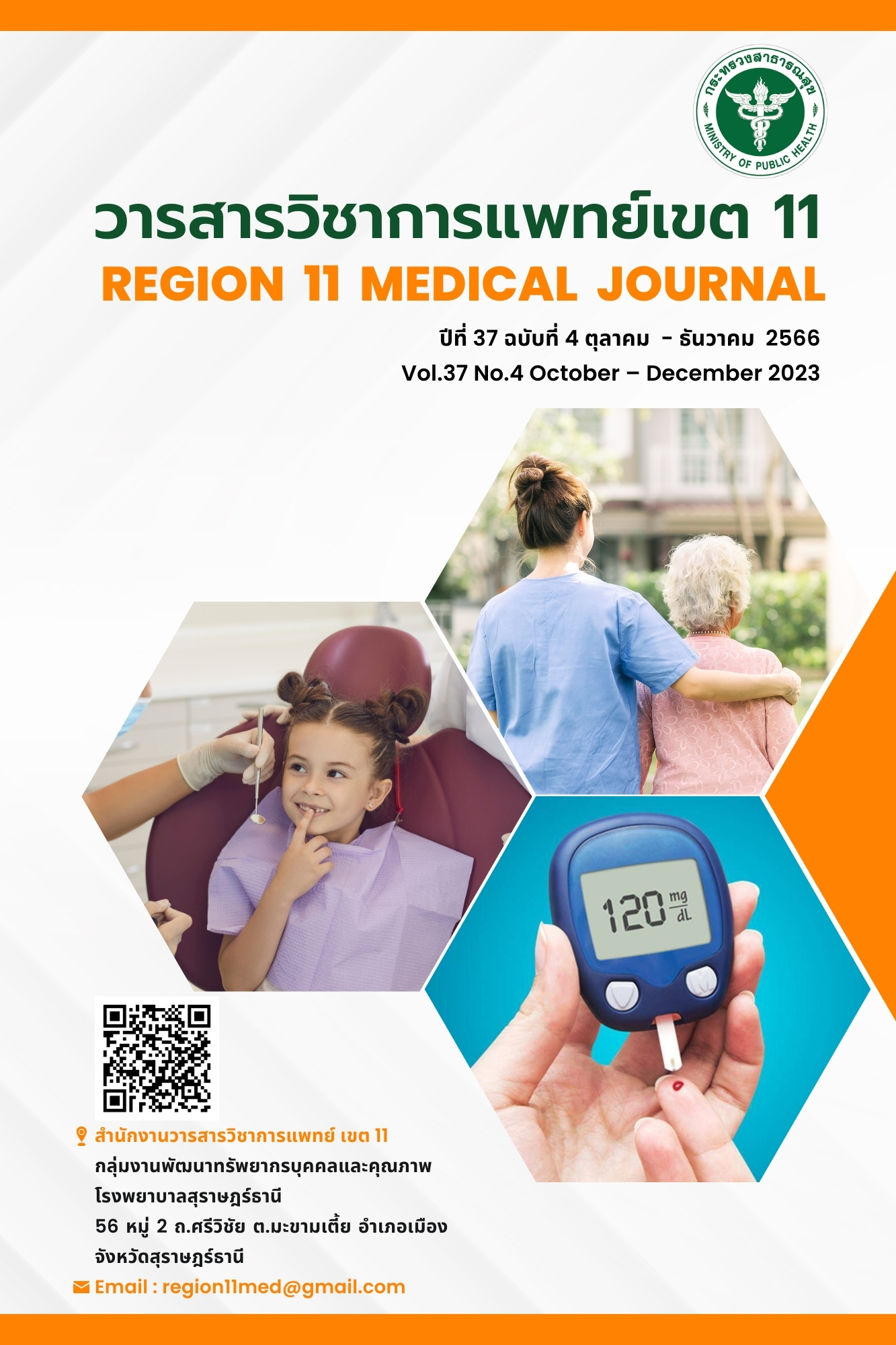ผลของโปรแกรมการดูแลตนเองบนพื้นฐานทฤษฎีการดูแลตนเองของโอเร็มและการมีส่วนร่วมของครอบครัวต่อการควบคุมระดับน้ำตาลในเลือดของผู้ป่วยเบาหวานชนิดที่ 2
คำสำคัญ:
เบาหวานชนิดที่ 2 , การควบคุมระดับน้ำตาล , การมีส่วนร่วมของครอบครัว , ทฤษฎีการดูแลตนเองของโอเร็ม , โปรแกรมการดูแลตนเองบทคัดย่อ
ที่มา : ปัญหาการควบคุมน้ำตาลไม่ได้ เป็นปัญหาที่สำคัญอันเกี่ยวข้องกับพฤติกรรมการดูแลตนเองทั้งด้านการบริโภคอาหารและการออกกำลังกาย ส่งผลให้เกิดภาวะฉุกเฉินที่มีระดับน้ำตาลในเลือดสูง (Diabetic Emergency)
วัตถุประสงค์ : เพื่อศึกษาผลการใช้โปรแกรมการดูแลตนเองบนพื้นฐานทฤษฎีการดูแลตนเองของโอเร็มและการมีส่วนร่วมของครอบครัวต่อการควบคุมระดับน้ำตาลในเลือดของผู้ป่วยเบาหวานชนิดที่ 2
วิธีการวิจัย: ผู้ป่วยเบาหวานจำนวน 30 รายที่มารับการรักษา ด้วยภาวะภาวะฉุกเฉินที่มีระดับน้ำตาลในเลือดสูง (Diabetic Emergency)อายุ 15-60 ปี ที่หอผู้ป่วยอายุรกรรมชาย 1 เก็บข้อมูลระหว่างวันที่ 1 ตุลาคม 2565 - 31 มกราคม 2566 เครื่องมือในการเก็บรวบรวม ได้แก่ แบบสัมภาษณ์ข้อมูลทั่วไปแบบสัมภาษณ์พฤติกรรมการดูแลตนเองเกี่ยวกับการควบคุมอาหารและการออกกำลังกาย สื่อการสอนผู้ป่วยเบาหวาน เครื่องตรวจวัดระดับน้ำตาลในเลือด สมุดประจำตัวผู้ป่วยเบาหวาน โดยมีค่าความเชื่อมั่นของแบบสอบถามเท่ากับ 0.85 วิเคราะห์ข้อมูลโดยใช้สถิติวิเคราะห์ข้อมูลทั่วไปด้วยการแจกแจงความถี่และร้อยละ วิเคราะห์ข้อมูลด้วยสถิติ Paired sample t-test และวิเคราะห์เนื้อหา (Content analysis)
ผลการวิจัย : ค่าเฉลี่ยของระดับน้ำตาลที่เกาะติดเม็ดเลือดแดงของกลุ่มทดลองภายหลังได้รับโปรแกรมการดูแลตนเอง ต่ำกว่า ก่อนการได้รับโปรแกรมการดูแลตนเองอย่างมีนัยสำคัญทางสถิติที่ระดับ p <0.05
สรุป : โปรแกรมการดูแลตนเองบนพื้นฐานทฤษฎีการดูแลตนเองของโอเร็มและการมีส่วนร่วมของครอบครัวสามารถสร้างแรงจูงใจในการเรียนรู้เพื่อปรับเปลี่ยนพฤติกรรมด้านการควบคุมอาหารและการออกกำลังกายของผู้ป่วยโรคเบาหวานชนิดที่ 2 ได้ ช่วยให้ผู้ป่วยควบคุมระดับน้ำตาลในเลือดได้ดี
เอกสารอ้างอิง
กระทรวงสาธารณสุข. ฐานข้อมูล HDC Service [อินเทอร์เน็ต]. 2564 [เข้าถึงเมื่อ 24 ตุลาคม 2564]. เข้าถึงได้จาก:https://hdcservice.moph.go.th/hdc/reports/page.php?cat_id=6a1fdf282fd28180eed7d1cfe0155e11.
สำนักงานสาธารณสุขจังหวัดมหาสารคาม. ฐานข้อมูล HDC Service [อินเทอร์เน็ต]. 2565 [เข้าถึงเมื่อ 2 มีนาคม 2565]. เข้าถึงได้จาก: https://mkm.hdc.moph.go.th/hdc/reports/page.php?cat_id=b2b59e64c4e6c92d4b1ec16a599d882b.
สำนักโรคไม่ติดต่อ กรมควบคุมโรค กระทรวงสาธารณสุข. รูปแบบการบริการป้องกันควบคุมโรคเบาหวาน ความดันโลหิตสูงสำหรับการสนับสนุนการดำเนินงาน NCD Clinic Plus. พิมพ์ครั้งที่ 1. นนทบุรี: โรงพิมพ์ชุมุมสหกรณ์การเกษตรแห่งประเทศไทย; 2560.
สำนักโรคไม่ติดต่อ กรมควบคุมโรค กระทรวงสาธารณสุข. หลักสูตรพยาบาลผู้ประสานงานโรคไม่ติดต่อเรื้อรังในชุมชน (โรคเบาหวานและความดันโลหิตสูง) Collabolative NCDs Nurse in Community (Diabetes and Hypertension). พิมพ์ครั้งที่1. กรุงเทพฯ: ศูนย์สื่อและสิ่งพิมพ์แก้วเจ้าจอม มหาวิทยาลัยราชภัฏสวนสุนันทา; 2560.
สมาคมโรคเบาหวานแห่งประเทศไทย ในพระราชูปถัมภ์สมเด็จพระเทพรัตนราชสุดาฯ สยามบรมราชกุมารี. แนวทางเวชปฏิบัติสำหรับโรคเบาหวาน. พิมพ์ครั้งที่ 2. ปทุมธานี: ร่มเย็นมีเดีย; 2560.
โชติกา สัตนาโค และจุฬาภรณ์ โสตะ. ผลของโปรแกรมการจัดการตนเองเพื่อควบคุมระดับน้ำตาลในเลือดของผู้ป่วยโรคเบาหวานชนิดที่ 2 ที่มีระดับน้ำตาลในเลือดสูง. วารสารการพยาบาลและการศึกษา. 2560;10(4):32-47.
สาวิตรี นามพะธาย. ผลของโปรแกรมการจัดการโรคเบาหวานด้วยตนเองต่อพฤติกรรมการควบคุมระดับน้ำตาลในเลือดและค่าเฉลี่ยสะสมในเลือดของผู้ป่วยโรคเบาหวานชนิดที่ 2 ที่ควบคุมไม่ได้ [วิทยานิพนธ์ปริญญาพยาบาลศาสตรมหาบัณฑิต]. นครปฐม: มหาวิทยาลัยคริสเตียน; 2561.
ญาณิสรา ปินตานา และนิทรากิจ ธีระวุฒิวงษ์. ผลของโปรแกรมจัดการตนเองต่อพฤติกรรมการจัดการตนเองของผู้ป่วยโรคเบาหวานชนิดที่ 2. วารสารการพยาบาลและสุขภาพ. 2561;12(11):72-83.
อนัญญา ลาลุน และบษพร วิรุณพันธ์. ผลของโปรแกรมการจัดการตนเองต่อระดับน้ำตาลสะสมในเลือดและคุณภาพชีวิตผู้ป่วยเบาหวานชนิดที่ 2 ในเขตรับผิดชอบโรงพยาบาลแก้งคร้อ จังหวัดชัยภูมิ.วารสารวิทยาลัยพยาบาลราชชนนีสุรินทร์. 2564;11(1):66-80.
สุชาดา พวงจำปา กาญจนา พิบูลย์ วัลลภ ใจดี และ เกษม ใช้ครองกิจ. ผลของโปรแกรมสนับสนุนการจัดการตนเองต่อความรู้พฤติกรรมการออกกำลังกาย จำนวนก้าวเดิน และระดับฮีโมโกลบินเอวันซีของผู้ป่วยเบาหวานชนิดที่ 2 . วารสารราย 4 เดือน. 2563;47(2):275-300.
มยุรี เที่ยงสกุล และสมคิด ปานประเสริฐ. การพัฒนารูปแบบการดูแลผู้ป่วยเบาหวาน โรงพยาบาลสมเด็จพระพุทธเลิศหล้า. วารสารวิชาการสาธารณสุข. 2562;28(4):696-710.
ศุภพงศ์ ไชยมงคล. ผลของโปรแกรมสนับสนุนการจัดการตนเองของผู้ป่วยเบาหวานชนิดที่ 2 อำเภอคอนสาร จังหวัดชัยภูมิ. วารสารศูนย์อนามัยที่ 9. 2564;15(37):112-122.
สุมาลี ราชนิยม และรัชชนก กลิ่นชาติ ผลของโปรแกรมสนับสนุนการจัดการตนเองต่อพฤติกรรมการจัดการตนเองในการฉีดอินสุลินของผู้ป่วยเบาหวานชนิดที่ 2. วารสารวิทยาลัยพระปกเกล้า จันทบุรี. 2561;29(2): 237-249.
เอกรัฐ จันทร์วันเพ็ญ และนภัสฐพร แสงอรุณ. ประสิทธิผลของเทคนิคการให้สุขศึกษาด้วยทีมสหวิชาชีพ ต่อการควบคุมระดับฮีโมโกลบินที่มีน้ำตาลเกาะ ผู้ป่วยเบาหวานชนิดที่ 2 โรงพยาบาลสิชล. วารสารระบบบริการปฐมภูมิและเวชศาสตร์ครอบครัว. 2011;3(1):6-11.
ดาวน์โหลด
เผยแพร่แล้ว
รูปแบบการอ้างอิง
ฉบับ
ประเภทบทความ
สัญญาอนุญาต
ลิขสิทธิ์ (c) 2023 วารสารวิชาการแพทย์เขต 11

อนุญาตภายใต้เงื่อนไข Creative Commons Attribution-NonCommercial-NoDerivatives 4.0 International License.






